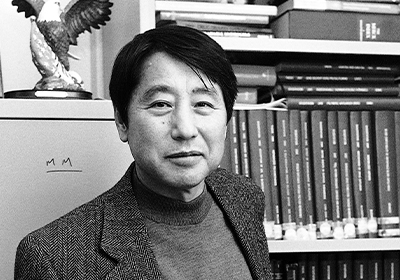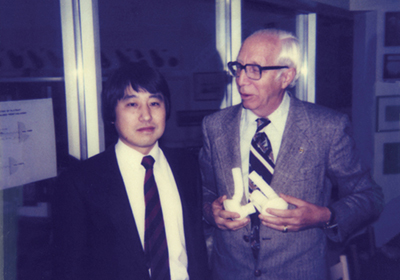
Author: Doug Dollemore
Sung Wan Kim, 1940-2020, valued friendships and reaching out to others as much as he did his role in the development of the artificial heart and drug delivery systems.
Carol Lim had just started at the University of Utah College of Pharmacy when her new colleague, Sung Wan Kim, approached her with an unusual request. He wanted to meet her parents.
By Western standards, this request might seem a bit antiquated. But to Lim and her parents, who, like Kim, were raised in South Korea, it was a charming reminder of traditions within their culture, where family and friendship are highly valued.
“I believe that he wanted to get to know my parents to see what kind of people raised me, so he could know me better,” says Lim, Ph.D., who is now interim chair of the department of pharmaceutics and pharmaceutical chemistry. “I really don’t remember much about the meal, but I do recall having a warm feeling because another faculty member in my department cared enough to meet my family.”
Kim, an emeritus U of U Health distinguished professor of pharmaceutics and pharmaceutical chemistry and a distinguished professor of bioengineering, died on Feb. 24, 2020 at University of Utah Hospital. He was 79.
Making connections and making people feel part of a larger community was something he embraced. He valued it as much as his contributions to the development of the first artificial heart as well as his pioneering work in biopolymer drug and gene delivery.
“You would always see him at lunch surrounded by his students,” says Chris Ireland, Ph.D., a friend and former dean of the College of Pharmacy. “I think that’s a really great indicator of how he connected with people in his lab. They enjoyed hanging out with him.”
By holding my hand, (Sung Wan) was saying to others that ‘He is one of us. He is my friend. You can trust him."
Born in Busan, South Korea on Aug. 21, 1940, Kim grew up in poverty and survived the terrors of the Korean War. Encouraged by his mother to seek a career in chemistry, he enrolled at Seoul National University, where he earned his bachelor’s degree in the science in 1963. Two years later he received his master’s degree in physical chemistry from the university.
In 1966, Kim moved to Salt Lake City to continue his studies at the U of U. There, he would meet and marry Hee Kyung. In addition to his wife, he is survived by his son, Alex, his daughter, Kara, and four grandchildren.
After Kim received his Ph.D. in 1969, U of U chemistry professor Henry Eyring, his friend and mentor, introduced him to Willem Johan Kolff. Kolff, regarded as one of the most important physicians of the 20th century and “father of the artificial organ,” would change the course of Kim’s career.
In conjunction with Kolff, Kim would enter the groundbreaking field of medicinal chemistry and biomaterials over next dozen years work on an artificial kidney membrane organ development. In 1982 this research contributed to successful implantation of the first artifical heart in a human patient.

His subsequent research into drug delivery using biopolymers had an enormous influence on the development of hydrogels, biodegradable drug conjugates, self-regulating drug delivery, and stimuli sensitive polymers
Among his contributions to this field was the design of new polymeric structures capable of carrying genes into cells, which is based on a deep understanding of physio-chemical, synthetic, and biological principles. The successful delivery systems are multifunctional and possess balanced individual contributions providing an optimal composition with outstanding properties. His laboratory also designed many biomaterials for delivery of anticancer drugs.
Kim held 38 patents and generated more than $30 million in research funds. In addition, he published more than 500 research papers, co-founded three biotech companies, and established the U of U’s Center for Controlled Chemical Delivery. He was elected to the National Academy of Medicine in 1999 and the National Academy of Engineering in 2003. He retired from the University in 2018.
A generous philanthropist, Kim supported a variety of organizations including academic institutions and medical centers. He enjoyed golf and travel, but what mattered to him most was forming strong relationships and supporting those around him. In particular, he was proud of the success of Korean students who had trained with him and then returned home to teach and create new companies.
During his years as dean of pharmacy, Ireland would travel to South Korea with Kim every year to meet with those alumni as well as visit schools and colleges of pharmacy. Often, Kim would hold his hand when they walked places, a sign of respect in Korean culture.
“It was a very kind gesture on his part. By holding my hand, he was saying to others that ‘Chris Ireland is one of us. He is my friend. You can trust him,’” says Ireland, who later served as chief administrative officer of the University of Utah Asia Campus, thanks in part to his relationship with Kim. “It helped me build relationships in a culture where friendship is everything. That epitomizes who Sung Wan was and why he was beloved by all of his students and colleagues.”
####